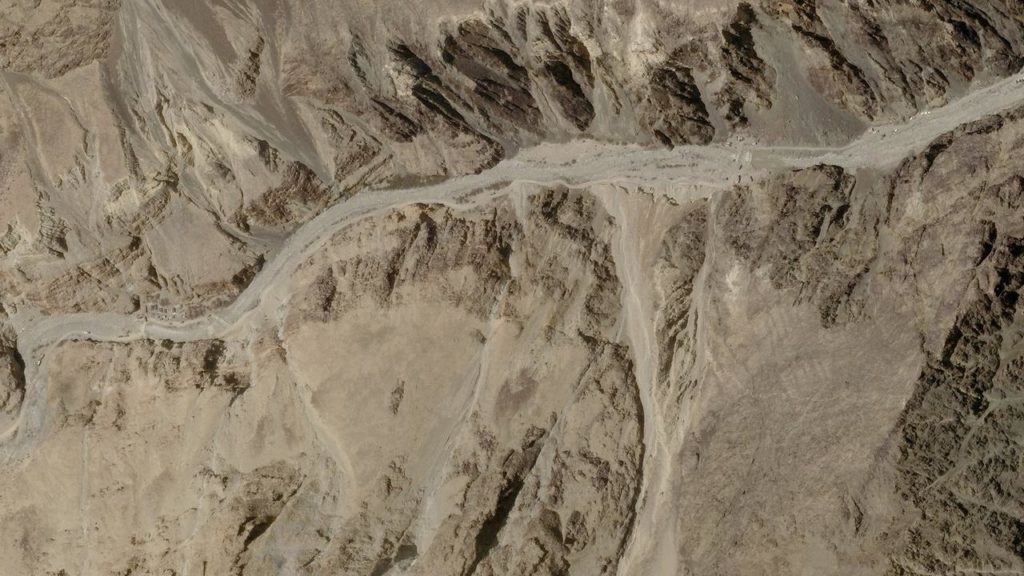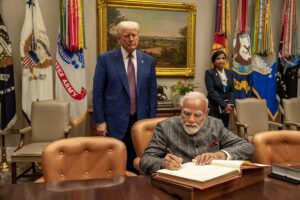Indian & Chinese Military Agree To Disengage On Border

FILE PHOTO: A satellite image taken over Galwan Valley in Ladakh, parts of which are contested with China, on June 16, 2020
Indian and Chinese military commanders have agreed to step back from a confrontation over a disputed stretch of border where a clash last week left 20 Indian soldiers dead, government officials in New Delhi and Beijing said on Tuesday.
“There was a mutual consensus to disengage,” an Indian government source said, commenting on the outcome of a parley on Monday that lasted almost 11 hours at the Line of Actual Control (LAC) or the de facto border, high in the western Himalayas.
During the clash in the Galwan Valley on June 15, soldiers from both sides beat each other with rocks and wooden sticks embedded with nails. But both sides have observed a long-held protocol to avoid using firearms on the sensitive, high altitude frontier.
The deadliest border clash in more than half a century between the nuclear armed giants had stunned India, and fuelled calls for a boycott of goods from China, its second biggest trading partner.
And while the agreement by commanders on the ground to step back will cool the situation, nationalist sentiment in India has been whipped up, and Prime Minister Narendra Modi remains under pressure to show he won’t be bullied by China.
Speaking in Beijing, China’s Foreign Ministry spokesman Zhao Lijian said the two sides had agreed to work toward peace and tranquillity.
Zhao said the latest parley revisited the consensus reached at a previous meeting between the army commanders on June 6, before the bloody clash, when they had agreed to de-escalate.
“In the meeting, both sides, on the basis of the consensus from the first army commander level meeting, had a candid and deep exchange of views on the border management and control issue, agreeing to take the necessary measures to lower the temperature on the situation,” Zhao said.
Asked if that meant troops on both sides would disengage, Zhao said: “relevant measures are being carried out by the two border forces in the area.”
Neither side has given details on how any de-escalation will take place, but Zhao said discussions would continue.
Zhao also dismissed Indian estimates that China lost 40 soldiers as “fake news”.
Beijing and New Delhi have made counter claims over whose forces were responsible for sparking the clash, but China has given few details of what happened.
Indian government officials say Chinese troops had intruded into India’s side of the poorly defined LAC at three or four locations in India’s Ladakh region, which leads on to the Aksai Chin plateau controlled by China but claimed by India.
Aside from the Galwan Valley, parts of which overlook a strategically important road, Indian and Chinese troops have also been facing off across the Pangong Lake – a finger of water extending from China’s Tibet Autonomous Region into Ladakh.
“Modalities for disengagement from all friction areas in Eastern Ladakh were discussed and will be taken forward by both the sides,” the Indian government source said.
In previous rounds of talks, China had asked India to stop all construction work in what it says is Chinese territory. For its part, India has been pushing China to withdraw its troops back to where they were in April.
Despite persistently seeking to improve ties with China since coming to power in 2014, Indian PM Modi will now have to reassess the relationship.
India was humiliated, and lost territory during a war with China in 1962, and has since fallen way behind in economic development.
India did not want a confrontation, but its experience with China has not been good, Ram Madhav, a general secretary of the ruling Bharatiya Janata Party told The Economic Times.
“We can’t let our guard down,” Madhav said.





